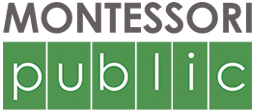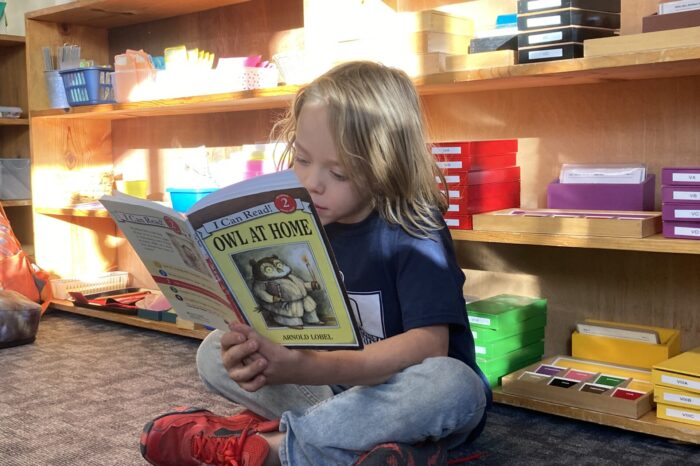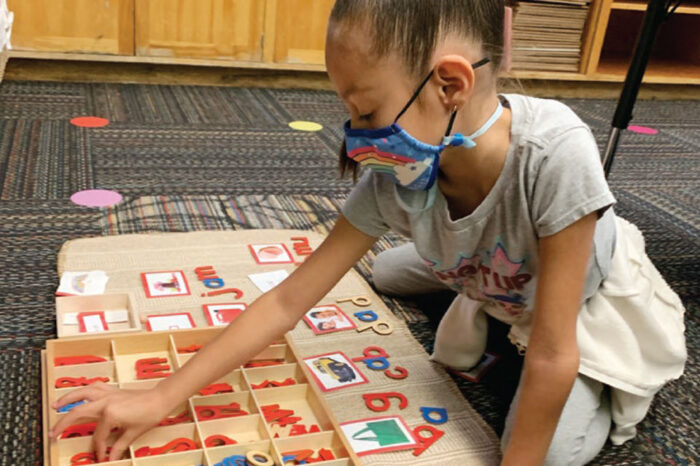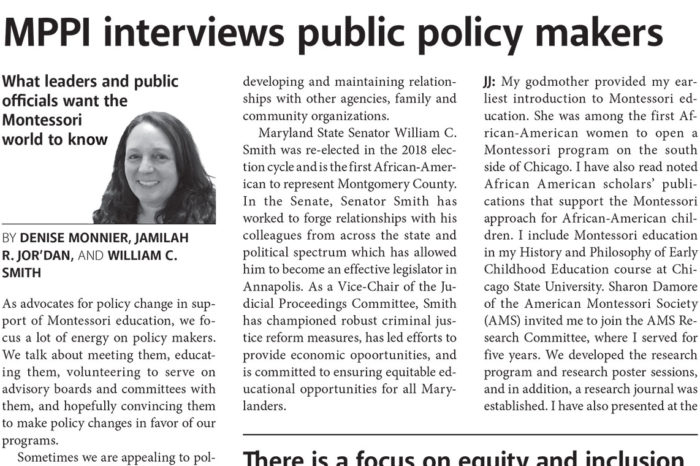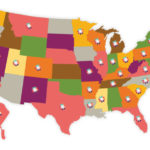Montessori advocacy organizations
35 states have active organizations and work—here’s how to join in
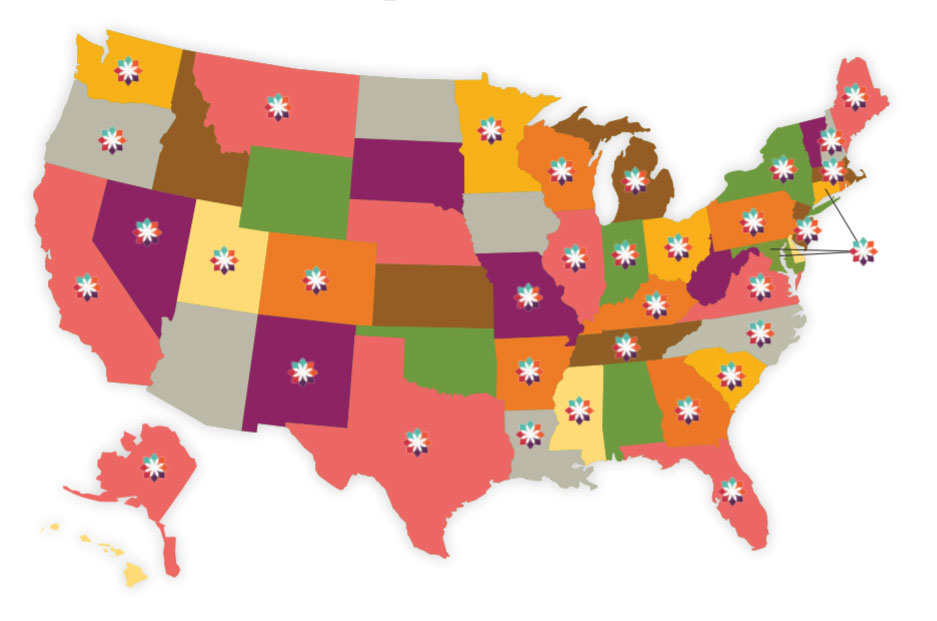
Advocacy organizations are making their way to middle America
The Montessori Public Policy Initiative (MPPI, online at montessoriadvocacy.org) is proud to support 35 state advocacy organizations. We’re excited about the work state advocates have done to encourage state policy changes. The movement towards credential recog-nition for Montessori teacher training continues to gain steam, with legisla-tion proposed in two more states, and Montessori advocates continue to make inroads with child care licensing and QRIS regulations. In addition, MPPI has grown its set of tools to support advocacy and is increasing capacity to provide coaching for state advocates. Our goal is advocacy organizations in 50 states working toward a policy land-scape in which high-fidelity Montes-sori education can expand and thrive.
A unified advocacy agenda is es-sential to ensuring ecumenical policy change. Many states have longstand-ing Montessori organizations that have historically engaged in policy and advocacy work, or have successfully taken on that challenge in recent years with the support of MPPI. If your state does not have an organization, or you have one but have not been engaged in advocacy, there are some steps you can take to get started.
It is essential to reach out to the Montessori schools in your state and identify stakeholders and the policy issues that they are facing. A quick survey can be a great way to make that connection, and you can create a short one free on SurveyMonkey, or with Google Forms. The Montessori Census (montessoricensus.org) is a great place to start to create a contact list for your state, and national Montessori organi-zations have lists of schools by state as well. A video conference or face to face gathering can help you to get to know each other and discuss your options more deeply.
There are many issues to consider when starting a state advocacy organi-zation. For example:
- Applying for non-profit status
- The need for an elected board, by-laws, articles of incorporation, etc.
- Group focus: limiting yourselves to advocacy, or serving members in other ways, such as networking or professional development
There are enough options to make just deciding where and how to start a difficult project.
One way to work through these questions is to engage your major stakeholders in a Strengths-Weakness-es-Opportunities-Threats (SWOT) analysis, which can inform organiza-tional mission and strategy, and help with direction and decision making. Depending on where you are in the process, and the Montessori presence in your state, this may involve just a few people or a larger group. It’s im-portant to be as inclusive as possible, seeking input from private, public, and charter schools across training affilia-tions, and from programs serving the breadth of age ranges from infant/tod-dler to adolescent.
Strengths and weaknesses come from within your organization or community, and opportunities and threats are typically external. Here we will look at advocacy initiative needs and capabilities, but this system can be used for anything you are considering.
For a budding organization, strengths could be the number of Montessori schools in your state, the longevity of those schools, the level of experience of the administrators, your founders’ enthusiasm and com-mitment to advocacy, relationships that have been established with state officials, or Montessori public school presence in your state.
Weaknesses could include a small Montessori community in your state, a lack of interested volunteers, no estab-lished relationships with state policy makers, absence of long-term adminis-trators in your community, or a dearth of Montessori public school options in your state.
From the external perspective, op-portunities could be the recent presence of Montessori in the news, enhanced support from MPPI, attention on early childhood education in the public and in state and federal government, or funding opportunities available be-cause of that attention. If you have no Montessori organization in your state, you have the opportunity to set one up, with many experienced states to look to for support. Challenging state pol-icies for Montessori schools could be an opportunity for organizing, driving more volunteers to your group.
Our goal is advocacy organizations in all 50 states in which high-fidelity Montessori education can expand and thrive.
External threats could include neg-ative perception of, or even ignorance about Montessori in your state, bad history with state policy makers, or no history of a “Montessori voice” in your state. State policies that constrain Mon-tessori schools could also be a threat, as they may limit the number of schools to join in the effort or diminish the commitment to full Montessori imple-mentation in existing schools because it is too difficult.
Items can fall into more than one category in this process. Choosing the best category, or recognizing the way that one item fits into more than one, can refine your priorities going forward. If you already have an estab-lished organization, you may see items in these categories to consider.
To pull some items out of this list that might inform the mission and strategy of your group, let’s look at an example. If your strengths include some long-standing schools with ex-perienced and knowledgeable admin-istrators, and your weaknesses consist of a small Montessori community and a low number of volunteers, you can establish a mission and strategy that is achievable within those parameters. Having long time Montessorians and well-established schools could give birth to an agenda around providing strong education about Montessori for your state policy makers, which could include tours of schools you know are excellent examples of what you are sharing with policy makers. If your volunteer capacity is low, then tackling just one specific policy issue to start makes sense. You could also focus on one specific state agency to appeal to for policy change. If your child care li-censing regulations are restrictive, you could set your goals there. Your organi-zation’s mission and strategy could be focused on using the strength of their Montessori knowledge and history to provide education to the state’s child care licensing body as leverage to make requests for exceptions or exemptions for Montessori programs.
Whether your new organization is large and well-supported or small and volunteer driven, you can engage in effective advocacy by carefully exam-ining your options and establishing goals and processes that are viable in your particular situation. By prioritiz-ing and planning realistically, small groups with little support can be highly effective, and large or well-supported groups can make the best use of the resources they have. No matter where you choose to dive in, it’s important that you get started; advocacy work is long-term, so your organization can grow as it progresses.
MPPI offers support and coaching for Montessori state advocacy organi-zations wherever they are in their de-velopment and advocacy work, as well as the opportunity to connect with other state groups in similar stages of growth or who may have experience with challenges you are facing. Contact us at [email protected] or [email protected].
